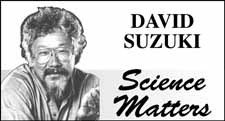Canada's towns and cities are at a crossroads. Down one path is urban sprawl. We all know where this well-worn route leads: endless pavement, long commutes and traffic jams, and high social and infrastructure costs. Continued sprawl threatens the health of our families, our communities, and the ecosystems that sustain us.
In the other direction is an extraordinary new path: ending sprawl using the principles of "smart growth" and creating compact, higher-density communities with public transit, bike paths, and walking trails, surrounded by precious farmland and green spaces like wetlands and woodlands.
Many Canadian municipalities have already started looking at ways to make their communities smarter and more compact. In B.C., Squamish and Prince George have gone through intensive planning processes to define what "smart growth" means and to craft plans to implement this new vision.
In one of the country's most innovative efforts to stem the outward spread of low-density development and confine growth to the urban core, politicians in the Town of Markham, north of Toronto, are considering a plan to establish one of Canada's first urban food belts. If approved, the plan would limit growth to areas that are already built up. Many municipalities in the Greater Toronto Area are facing modest intensification along with more sprawl over the next couple of decades, but Markham is the only one to consider containing all of its growth within existing boundaries. This plan is largely aimed at protecting the Town's few remaining farms, fields, and forests from С����Ƶ dug up and paved over.
By preventing sprawl, Markham's food belt plan will create incentives for the Town to intensify growth. This would mean new home and multi-residential construction within the current urban boundary - within easy access of public transit and existing shopping malls, schools, recreational facilities, and other infrastructure, such as water and sewage systems. Markham could then preserve its ability to produce valuable commodities, like locally grown food, and continue to benefit from the critical ecological services that farmlands and green spaces provide, like clean air and water, healthy soil, and habitat for wildlife like songbirds and wildflowers.
People often ignore the fact that the farmland and green spaces within and surrounding urban areas provide an astonishing range of ecological services for free, like filtering and storing drinking water and preventing erosion by ensuring that riverbanks remain stable. Research by the David Suzuki Foundation and others has shown that nature's benefits are extremely valuable in monetary terms, and in some cases are truly priceless.
The research report, Ontario's Wealth, Canada's Future: Appreciating the Value of the Greenbelt's Eco-Services, conservatively estimated that the Greenbelt provides $2.6 billion a year in ecological services such as recreational opportunities, pollination, and capture and storage of carbon in its remnant forests, farmland, and rich soils.
Replacing ecological services with engineered and manufactured substitutes such as water-filtration plants and dykes or retention walls can cost millions of dollars. Some ecosystem services, such as the aesthetic and psychological benefits of natural and rural landscapes, are impossible to replace at any price.
Municipalities across the country must choose whether to continue along the path of sprawling infrastructure and increased dependence on cars, or to stop sprawl and protect green spaces by making communities more compact. This is one area where politicians at the local level, such as those in Markham, Squamish, and Prince George, can make a big impact and create a greener, healthier future for their communities that will kick-start a wave of smart, compact urban growth throughout the country.
Learn more at www.davidsuzuki.org.




